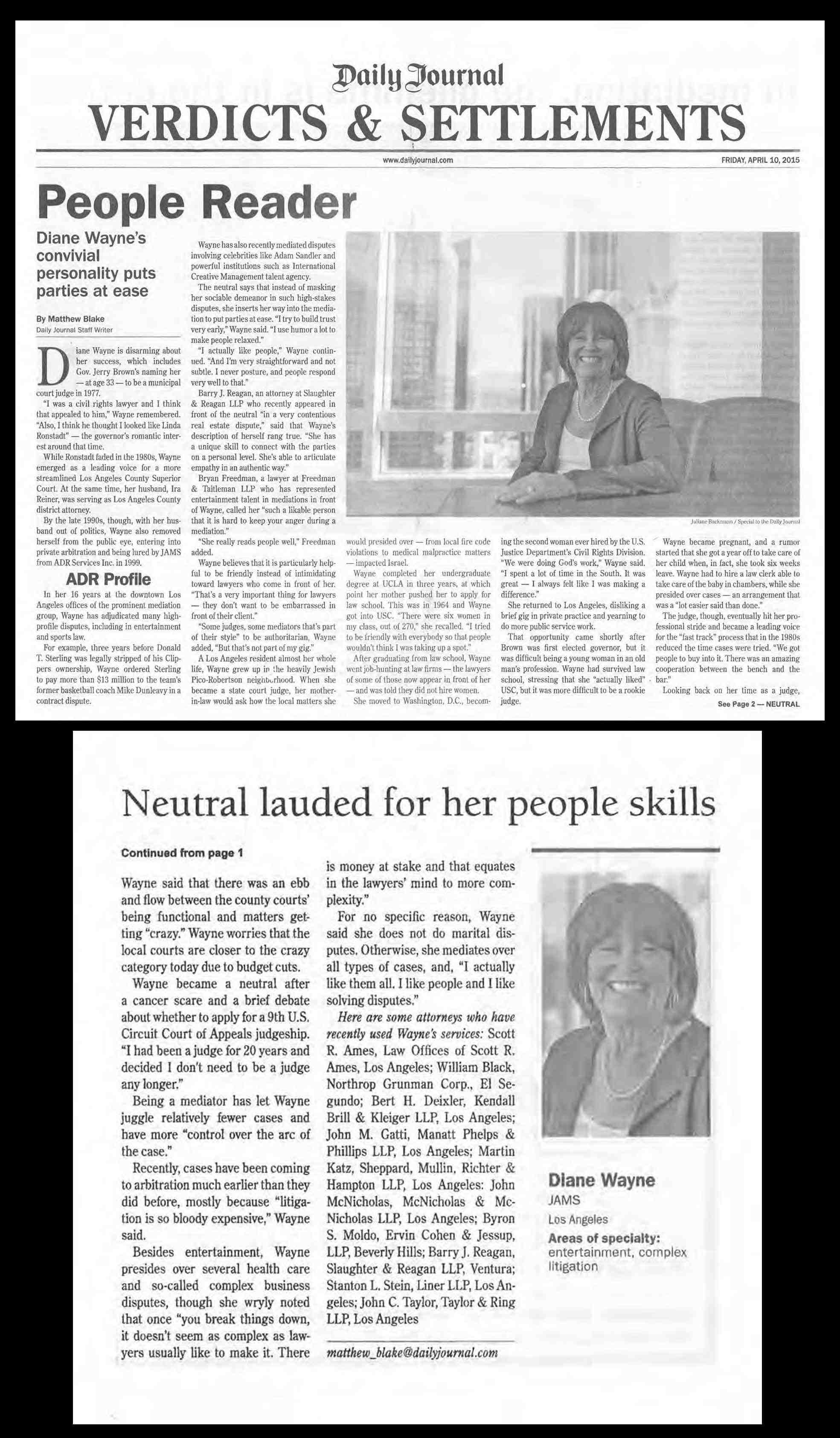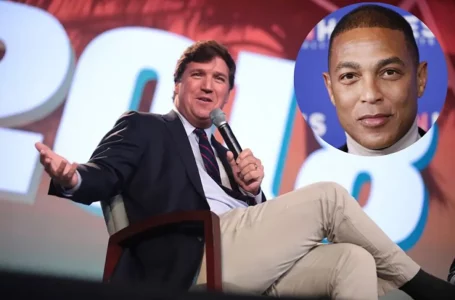Diane Wayne is disarming about her success, which includes Gov. Jerry Brown’s naming her – at age 33 – to be a municipal court judge in 1977.
“I was a civil rights laWyer and I think that appealed to him,” Wayne remembered. “Also, I think he thought I looked like Linda Ronstadt” – the governor’s romantic interest around that time.
While Ronstadtfaded in the 1980s, Wayne emerged as a leading voice for a more streamlined Los Angeles County Superior Court. At the same time, her husband, Ira Reiner, was serving as Los Angeles County district attorney.
By the late 1990s, though, with her husband out of politics, Wayne also removed herself from the public eye, entering into private arbitration and being lured by JAMS from ADR Services Inc. in 1999.
ADR Profile
In her 16 years at the downtown Los Angeles offices of the prominent mediation group, Wayne has adjudicated many highprofile disputes, including in entertainment and sports law.
For example, three years before Donald T. Sterling was legally stripped of his Clippers ownership, Wayne ordered Sterling to pay more than $13 million to the team’s former basketball coach Mike Dunleavy in a contract dispute.
Wayne has also recently mediated disputes involving celebrities like Adam Sandler and powerful institutions such as International Creative Management talent agency.
The neutral says that instead of masking her sociable demeanor in such high-stakes disputes, she inserts her way into the mediation to put parties at ease. “I try to build trust very early,” Wayne said. “I use humor a lot to make people relaxed.”
“I actually like people,” Wayne continued. “And I’m very straightforward and not subtle. I never posture, and people respond very well to that.”
Barry J. Reagan, an attorney at Slaughter & Reagan LLP who recently appeared in front of the neutral “in a very contentious real estate dispute,” said that Wayne’s description of herself rang true. “She has a unique skill to connect with the parties on a personal level. She’s able to articulate empathy in an authentic way.”
Bryan Freedman, a lawyer at Freedman & Taitleman LLP who has represented entertainment talent in mediations in front of Wayne, called her “such a likable person that it is hard to keep your anger during a mediation.”
“She really reads people well,” Freedman added.
Wayne believes that it is particularly helpful to be friendly instead of intimidating toward lawyers who come in front of her. “That’s a very important thing for lawyers – they don’t want to be embarrassed in front of their client.”
“Some judges, some mediators that’s part of their style” to be authoritarian, Wayne added, “But that’s not part of my gig.”
A Los Angeles resident almost her whole life, Wayne grew up ill the heavily Jewish Pica-Robertson neighb,rhood. When she became a state court judge, her motherin-law would ask how the local matters she would presided over – from local fire code violations to medical malpractice matters -impacted Israel.
Wayne completed her undergraduate degree at UCLA in three years, at which point her mother pushe4 her to apply for law school. This was in 1964 and Wayne got into USC. “There were six women in my class, out of 270,” she recalled. “I tried to be friendly with everybody so that people wouldn’t think I was taking up a spot.”
After graduating from law school, Wayne went job-hunting at law firms- the lawyers of some of those now appear in front of her – and was told they did not hire women.
She moved to Washington, D.C., becoming the second woman ever hired by the U.S. Justice Department’s Civil Rights Division. “We were doing God’s work,” Wayne said.
“I spent a lot of time in the South. It was great – I always felt like I was making a difference.”
She returned to Los Angeles, disliking a brief gig in private practice and yearning to do more public service work.
That opportunity came shortly after Brown was first elected governor, but it was difficult being a young woman in an old man’s profession. Wayne had survived law school, stressing that she “actually liked” · USC, but it was more difficult to be a rookie judge.
Wayne became pregnant, and a rumor started that she got a year off to take care of her child when, in fact, she took six weeks leave. Wayne had to hire a law clerk able to take care of the baby in chambers, while she presided over cases – an arrangement that was a “lot easier said than done.”
The judge, though, eventually hit her professional stride and became a leading voice for the “fast track” process that in the 1980s reduced the time cases were tried. “We got people to buy into it. There was an amazing cooperation between the bench and the bar.”
Looking back on her time as a judge, Wayne said that there was an ebb and flow between the county courts’ being functional and matters getting “crazy.” Wayne worries that the local courts are closer to the crazy category today due to budget cuts.
Wayne became a neutral after a cancer scare and a brief debate about whether to apply for a 9th U.S. Circuit Court of Appeals judgeship. “I had been a judge for 20 years and
decided I don’t need to be a judge any longer.”
Being a mediator has let Wayne juggle relatively fewer cases and have more “control over the arc of the case.”
Recently, cases have been coming to arbitration much earlier than they did before, mostly because “litigation is so bloody expensive,” Wayne said.
Besides entertainment, Wayne presides over several health care and so-called complex business disputes, though she wryly noted that once “you break things down, it doesn’t seem as complex as lawyers usually like to make it. There is money at stake and that equates in the lawyers’ mind to more complexity.”
For no specific reason, Wayne said she does not do marital disputes. Otherwise, she mediates over all types of cases, and, “I actually like them all. I like people and I like solving disputes.”
Here are some attorneys who have recently used Wayne’s services: Scott R. Ames, Law Offices of Scott R. Ames, Los Angeles; William Black, Northrop Grunman Corp., El Segundo; Bert H. Deixler, Kendall Brill & Kleiger LLP, Los Angeles; John M. Gatti, Manatt Phelps & Phillips LLP, Los Angeles; Martin Katz, Sheppard, Mullin, Richter & Hampton LLP, Los Angeles: John McNicholas, McNicholas & McNicholas LLP, Los Angeles; Byron S. Moldo, Ervin Cohen & Jessup, LLP, Beverly Hills; Barry ]. Reagan, Slaughter & Reagan LLP, Ventura; Stanton L. Stein, Liner LLP, Los Angeles; John C. Taylor, Taylor & Ring LLP, Los Angeles.
Diane Wayne
JAMS
Los Angeles
Areas of specialty:
entertainment, complex litigation
————————————————–
matthew_blake@dailyjournal.com





